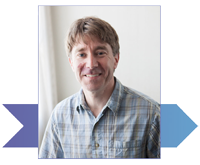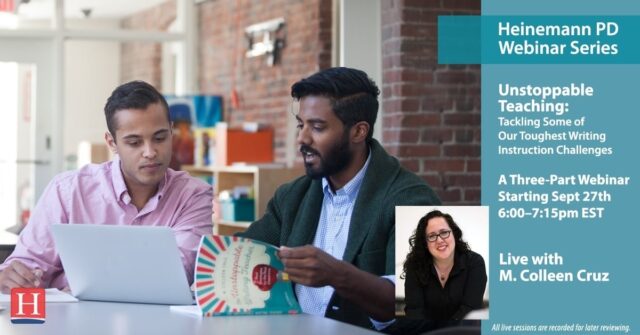
"I guess I remembered clearest of all the early mornings, when the lake was cool and motionless, remembered how the bedroom smelled of the lumber it was made of and of the wet woods whose scent entered through the screen. The partitions in the camp were thin and did not extend clear to the top of the rooms, and as I was always the first up I would dress softly so as not to wake the others, and sneak out into the sweet outdoors and start out in the canoe, keeping close along the shore in the long shadows of the pines."
-From “Once More to the Lake,” by E.B. White
As a teacher, late August hits with the slap of a Sunday night. Our new crop of students looms over us, and we skitter around our classrooms like squirrels in sandals, frantically rearranging classroom furniture, speed-typing new team lists, and stapling up bulletin boards with the rapid staccato of nail-gun enthusiasts. At this time when our favorite summer memories have been shoved to the background, perhaps it’s good to take a few minutes to bring them back into focus. To take a moment during this educator limbo – this in-between time when we have one toe still dipped in summer, but we’re leaning our weight into the school year ahead. During this time when my teaching metabolism is racing, I want to hang on to some of what the summer meant to me, and maybe to all educators…
It was the first full week of summer, and I was huddled over a laptop, clicking as softly as possible to not wake my extended family, who were nestled in bedrooms and corners all through the cottage. It was named Blueberry Cottage, and though it sounded impossibly quaint, this spot didn’t disappoint. It was the long-time family home of some teacher friends, in a remote spot on the Blue Hill peninsula, in Downeast Maine, about an hour’s drive from Acadia National Park. It was an ideal vacation house – steps leading down to the rocks on the water’s edge; wooden dock stretching out over the surface of the pond; enough space for everyone to hunker down, but not enough to escape from one another for long; canoes and kayaks for exploring; a jumping rock to paddle to; loons calling to each other in the cove at night. And yes, huge swaths of blueberries on the hill just above (not ripe in late June, unfortunately). Early-morning sounds – little snores from behind the pine-board walls and the pattering of smaller feet heading downstairs to the bathroom – were off my right side. To my left out the bay window was an expanse of beautiful, clear water.
When teachers come to spots like these for the summer – when we “rusticate” – we have many agendas. In late June, the goal was “coming down” from the school year. The feeling of our shoulders dropping, the dreams that didn’t involve report cards and year-end projects. We remembered what it was like to recline in a hammock
(“I’m taking a nap, dammit!”). We told ourselves that we were leaving school behind, and perhaps for the first time in many months, we didn’t lug along a rotator-cuff-tweaking tote bag stuffed with student papers to grade and professional books to consult. We took a chance to breathe in and exhale out the school year, with all its shortcomings (and successes), and to start anew. Isn’t that what summer is all about – the infinite possibility of what could be? For me as a kid, the beauty of summer was the notion that anything could happen – you had all the time in the world for chance adventures with friends, trips to the beach, drive-in movies. I still feel the same. If August is a teacher’s restless Sunday night, late June and July are like Friday evenings – full of boundless opportunities for fun and joy and reinvention, with no pressure in sight.
Summer is a hugely important time for teachers – not because it gives us time “off,” but because it’s a different kind of “on.” For most of us, we didn’t really leave school behind. Summer is a time to cast off the flops of the year (“What was I thinking with that lesson?”) and to reinvent. We reimagine ourselves – in the words of Ellin Oliver Keene and Matt Glover’s recent book – as the teachers we want to be. If the hum and action of the school year is like a stir fry – sizzling, crackling, requiring quick action and reaction, when ingredients have to be close at hand – summer is a slow cooker. Thoughts sit in the back of our minds and burble up to the surface occasionally. We’re given a rare chance to ponder without immediate action. How could I change up my reading approach next year to engage kids more? How can I make my students’ writing more authentic? What can I do to build a greater sense of community in my classroom? What would I love to try if I could do anything this year? In early summer, we scheme and dream and let these questions simmer in our minds.
During the school year, our teaching lives can be so full, the pace so frenetic, that we also need time to reconnect with our personal passions, interests, and inspirations. Summer is our time to slow down, soak up the things that feed us personally, and replenish ourselves with these experiences. It might be traveling with family, a trip to the outdoors, taking in the action at a baseball game, or appreciating a breathtaking piece of artwork. These moments can enrich our teaching implicitly – making us feel whole, reenergized, and ready to face the challenges of the classroom – and in more overt ways. In her essay, “What Price Beauty,” from The Teacher You Want to Be, Keene discusses the need for teachers to share with their students the sense of wonder and beauty they have felt from books, art, nature, and life in general. Tell the children, she says, about our own “aesthetic experiences” – these moments that capture us, mind, heart, and soul.
Tell them how your experience stopped you in your tracks, how you felt a chill, how you couldn’t turn away, how you were compelled to re-create the experience. Talk of understanding and insights you hadn’t experienced before. Speak of the experience with the awe it deserves. Help them feel what you felt.
It’s late August, and as I gaze around my classroom just before my school year begins, I’m excited, but I’m wistful for the stillness of that about-to-wake cottage. I’m thinking over the little moments of beauty from those days in Maine. The giggling daughters plunging into the cold water off the raft. The moments gliding silently in the canoe, scanning the pine trees for the pair of bald eagles. The sound of the rain pounding on the roof from the late-night storm. Maybe I’ll use these in a writing piece I’ll model for my fifth graders, or in a share at our classroom morning meeting. Or perhaps they’ll be just lovely summer memories I’ll collect and store away, like favorite stones from the pond’s shoreline.
As the September vortex pulls me into this all-consuming job that I love, I need to remind myself about those early summer moments and ways of being. Will there be any hammock time this autumn? Doubtful. But amidst the squirrel-like frenzy, I hope to hold onto to some of the quiet and reflection of June and July. Out of it sprung a gift: what Tom Newkirk calls “the privilege to experiment.” Newkirk advises us to “think small” – that opening up even 5% of our teaching practice to change is plenty. In early summer I dreamed big – brainstorming some serious shifts in my writing workshop – but now, as the calendar turns and my teaching stir fry crackles with new activity, I won’t pretend I can (or should) try it all. But I do plan to hold onto a piece of that spirit of change, reinvention, and personal “revision.” I want to remember to stand back, observe, and listen carefully – to my students, and to that voice that reminds me about the teacher I aspire to be. Amidst the bustle of this overwhelming season, I want to take time to try something new – and maybe a little uncertain – with my teaching. I’ll make time to turn away from my bursting to-do list to allow my hopes and dreams for the year to percolate up in my mind, like air bubbles to the surface of the pond.
Keene, Ellin Oliver. 2015. “What Price Beauty? A Call for Aesthetic Education.” In The Teacher You Want to Be: Essays about Children, Learning, and Teaching, 78-93. Portsmouth, NH: Heinemann.
Newkirk, Thomas. 2015. “On the Virtue of Thinking Small: Reclaiming Teacher Research.” In The Teacher You Want to Be: Essays about Children, Learning, and Teaching, 210-223. Portsmouth, NH: Heinemann.
Chris Hall is a member of the 2016 Heinemann Fellows. Chris engages his middle school students by incorporating meaningful projects to “focus their learning across subject areas.” Their inquiry often incorporates town landmarks or local historical areas as expedition projects for his students, which he says brings students closer to their community.



